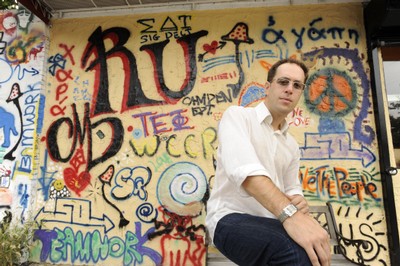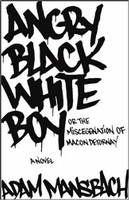
While the musical movement’s sense of pastiche, rhythm and repurposing is most definitely a driving force in Mansbach’s award-winning fiction, hip-hop is better evidenced in how he writes - sampling a wide range of styles and topics to create his own distinctive beat.
His most recent novel, The End of the Jews, a California Book Award-winner, depicts two generations of Jewish writers borrowing from each other’s lives for their own fiction. But The New York Times says this book is most creative in how it “explores other forms of borrowing: the creative interchange between blacks and Jews, and the give-and-take-dynamic of artistic partnership.” Mansbach’s forthcoming book Rage is Back ventures into magic realism, with graffiti artists finding secret staircases in New York City that transport 24 hours ahead. And another, Nature of the Beast, a graphic novel is also in the works.
As the 2009-10 New Voices Professor at Rutgers–Camden, Mansbach is teaching an undergraduate course on hip-hop and MFA courses on fiction and “Keeping it Unreal,” a craft course on uses of magic realism in American literature.

According to Lisa Zeidner, a professor of English at Rutgers–Camden, where she directs the MFA program in creative writing, Mansbach has a very distinctive voice as a novelist. “[He’s] jazzy, penetrating, provocative. He has been amazingly prolific for a young writer. He has published not just fiction, but a book of poems and essays, so his presence here really matches our multi-genre approach to writing” she notes.
His Rutgers–Camden hip-hop course aims to be far more complex than simply breaking down terms like b-boying (break dancing) or listening to an incredible playlist. Mansbach will address the socioeconomic underpinnings of the genre and how it has influenced other art forms, like literature, theater, and poetry, as well as politics and pedagogy. Not to mention, the rap produced today is quite removed from how hip-hop began.
Last year Mansbach articulated hip-hop’s origins in the Los Angeles Times: “Born in the Bronx in the early 1970s, hip-hop was rooted in the desire to ferment a sense of community in the wake of economic deprivation and governmental neglect. It fostered artistic collectivity and friendly competition and changed the face of a city broken into gang fiefdoms, allowing young people to move through the five boroughs with new freedom.”
To students at Rutgers–Camden, Mansbach will offer a new understanding to the music they may download without knowledge of its unique history: “Kids who are 18 have grown up with hip-hop as a given. For a lot of them there is a disconnect from what hip-hop looks like today from how it originated from social protests,” says Mansbach. “It’s important for people to understand its history better and its potential, how it’s been changed with its interface with global capitalism.”
In addition to an extensive reading list that includes Chang’s Can’t Stop, Won’t Stop and Bradley’s Book of Rhymes, students, as well as the extended campus community, will have the opportunity to listen to a series of speakers, who are experts and artists in the field, during free periods in the Campus Center. Featured speakers include ethnomusicologist Joseph Schloss, author of Making Beats and Foundations, on Oct. 1; graffiti artist and historian Allen Ket on Oct. 20; hip-hop feminist Joan Morgan, author of When Chickenheads Come Home to Roost, on Nov. 5; and spoken-word artist Kevin Coval on Dec. 3.
Mansbach, who has been teaching at universities across the globe, says Camden is a city ripe for this kind of discourse. “Hip-hop is talked about everywhere and listened to everywhere, but Camden is in a way an ideal place to talk about it, because all of the socioeconomic factors that led to hip-hop’s creation in the Bronx in the 80s and 70s, you see affecting Camden as well.”
New Jersey in general is a very important place historically for hip-hop. One of hip-hop’s first major hits “Rapper’s Delight,” by the Garden State’s Sugar Hill Gang, celebrates its thirtieth anniversary this year. “New Jersey had one of the earliest and most vibrant hip-hop scenes,” asserts Mansbach.
Learning about hip-hop will not only raise awareness at Rutgers–Camden of its history, but its philosophy, something Mansbach says has universal appeal. “Hip-hop requires very diligently searching for sounds that fit for you. To an extent, that notion can be applied to life.”
Media Contact: Cathy K. Donovan
(856) 225-6627
E-mail: catkarm@camden.rutgers.edu